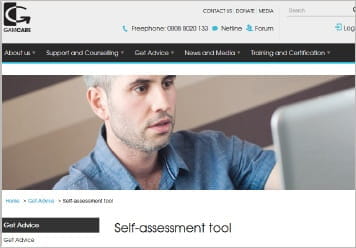Responsible Gaming
.
 Responsible Gambling is an important issue and is often mentioned in relation to problem gambling, gambling addiction and pathological gambling. Here, you will find everything you need to know about issues with gambling, how to recognise problems, and where to get help if you are concerned for yourself, or your friends and family.
Responsible Gambling is an important issue and is often mentioned in relation to problem gambling, gambling addiction and pathological gambling. Here, you will find everything you need to know about issues with gambling, how to recognise problems, and where to get help if you are concerned for yourself, or your friends and family.
Why Is This Topic So Important?
Gambling can (although not necessarily) lead to gambling addiction. This problem gambling can lead to serious financial and social problems, and therefore should not be underestimated by any means. Players may find that their gambling behaviour has gone out of control and they need help and support to manage the situation. Slot machines have the highest addiction rate. This is mainly due to the fast gameplay, and the various visual and audio effects which can engage the player more efficiently than other casino games.
What Is Problem Gambling?
In general terms, problem gambling is characterised by numerous difficulties in restricting time and/or money spent on gambling, which can lead to negative consequences for the gambler, other people and the community as a whole. Basically, any form of gambling that causes harm to the gambler or others can be deemed problem gambling. Pathological gambling, or gambling disorder is classified as similar to substance-related addictions, rather than an impulse control disorder. There are 9 symptoms which are used to assess whether a person has a gambling disorder. These include the need to gamble with increasing amounts of money to achieve the same level of excitement, lying to conceal the extent of a gambling habit, chasing losses and increased gambling during times of distress. If 4 of the 9 symptoms are experienced within a 12 month period, the gambler can be diagnosed as having a gambling disorder.
Who Is Most at Risk of Becoming Addicted?
There are various reasons and different factors that can lead to someone becoming addicted to gambling. As already mentioned, gambling does not necessarily lead to gambling addiction. Yet it has been found that certain types of people can be more susceptible to gambling addiction. Triggering factors for problem gambling can include certain personality traits (e.g. lack of impulse control, narcissistic attitude), genetic or neurological conditions (lower levels of norepinephrine or serotonin deficiencies) and mental health disorders (depression, anxiety). Plus, social factors such as education, religion, health and occupation can also play a part.
How Can I Test Myself?
There are various self-assessments available online, that you can take to help identify if your gambling is at a problematic level. Generally speaking, these tests work merely as an indicator of any problems, and it is highly recommended to seek professional help to deal with your gambling habits. You should treat the problem as soon as possible, before any serious harm happens. By speaking with a counsellor or psychologist, you can ensure that you get specific help and advice tailored towards your specific situation and needs. But of course, these self-assessments are a good starting point for you to notice if you are in danger, and give you a quick, simple (and anonymous) summary of your general situation.
 www.gamcare.org.ukThe self-assessment from GamCare is a quick and simple test that has been developed to identify any early signs of risky gambling behaviour. The test consists of 16 statements, which you rate on a scale of 0 – 10 according to how much they apply to you and your gambling behaviour (0 does not apply at all, 10 applies completely). At the end of the test, you receive detailed feedback based on the answers you gave which shows how gambling is affecting 4 different areas of your life: time, stakes, finances and relationships. You will also be given links to additional resources where you can get support.
www.gamcare.org.ukThe self-assessment from GamCare is a quick and simple test that has been developed to identify any early signs of risky gambling behaviour. The test consists of 16 statements, which you rate on a scale of 0 – 10 according to how much they apply to you and your gambling behaviour (0 does not apply at all, 10 applies completely). At the end of the test, you receive detailed feedback based on the answers you gave which shows how gambling is affecting 4 different areas of your life: time, stakes, finances and relationships. You will also be given links to additional resources where you can get support.
 www.gambleaware.orgThe test from GambleAware takes only a few minutes to complete. You answer just 9 questions relating to your gambling behaviour. Each question has a choice of 4 answers – never, sometimes, most of the time or almost always. You simply select the answer which best describes your situation. Once you have completed the test, you will be presented with a summary of your situation. If it is identified that you may have a gambling problem, you will be given the phone number for the National Gambling Helpline, where you can speak to someone in more detail about your personal situation. There are also links to various other organisations and charities who may be able to support you.
www.gambleaware.orgThe test from GambleAware takes only a few minutes to complete. You answer just 9 questions relating to your gambling behaviour. Each question has a choice of 4 answers – never, sometimes, most of the time or almost always. You simply select the answer which best describes your situation. Once you have completed the test, you will be presented with a summary of your situation. If it is identified that you may have a gambling problem, you will be given the phone number for the National Gambling Helpline, where you can speak to someone in more detail about your personal situation. There are also links to various other organisations and charities who may be able to support you.
 www.gamblersanonymous.org.ukGamblers Anonymous is a community-based service that treats problem gamblers in England and Wales. In order to determine if the service could be of use to you, there is a test you can complete to determine if you are indeed dealing with gambling addiction. There are 20 questions linked to your gambling habits, requiring simple yes or no answers. Your answers will be calculated automatically on submitting the form after answering all of the questions. Anyone answering more than 7 questions with a ‘yes’ answer is considered to be struggling with a gambling problem. Regardless of your score, you will be advised to visit the meetings section of Gamblers Anonymous to check information on groups in your local area. The test does, however, give you a perspective on whether your gambling habits would be considered compulsive or not.
www.gamblersanonymous.org.ukGamblers Anonymous is a community-based service that treats problem gamblers in England and Wales. In order to determine if the service could be of use to you, there is a test you can complete to determine if you are indeed dealing with gambling addiction. There are 20 questions linked to your gambling habits, requiring simple yes or no answers. Your answers will be calculated automatically on submitting the form after answering all of the questions. Anyone answering more than 7 questions with a ‘yes’ answer is considered to be struggling with a gambling problem. Regardless of your score, you will be advised to visit the meetings section of Gamblers Anonymous to check information on groups in your local area. The test does, however, give you a perspective on whether your gambling habits would be considered compulsive or not.
www.bigdeal.org.ukBig Deal is a website that provides online advice for young problem gamblers about where to get help. It also provides tips for young people on how to gamble responsibly. The self-assessment consists of 9 questions, with 4 possible answers to each. At the end of the test, you will be given a brief summary of whether your gambling behaviour is problematic, along with a contact number to speak to a trained professional anonymously about your problem.
www.rcpsych.ac.ukOn the website of the Royal College of Psychiatrists, you will find detailed information about problem gambling, including an overview of the symptoms, who is most at risk, plus various treatments. There is a 10 question test, entitled “Is it a problem for me?”. You answer yes or no to each of the questions and add up your total. There is a breakdown showing whether you may have a problem and whether it is classed as problem gambling or pathological gambling.
The Next Steps – Organisations That Can Help
It is extremely important to take the issue of problem gambling seriously. Left untreated, it can lead to disastrous consequences, like losing all of your money, your home and even your family. The self-assessment is the first step in recognising you have a problem, but you should also listen to your friends and family, they may identify problems with your behaviour before you notice it yourself. When a problem is identified, you should seek help and support without delay. Another recommended action is to be upfront and honest with your relatives, rather than shamefully hiding the true extent of your problem from your nearest and dearest. You would be surprised how caring, understanding and supportive your relatives can be when they understand your situation. Plus, it is often an easier road to recovery when you have the support of your loved ones behind you. On the other hand, if a family member opens up to you about their own gambling problems, it is important to refrain from accusations and blame. It will not help the situation and will often lead to the affected problem gambler withdrawing away from their family for support. There are various charities and organisations that you can contact for support with problem gambling. You can even bring your relatives for moral support in taking the first step to recovery. Such organisations include gambleaware.co.uk, gamblersanonymous.org.uk and gamcare.org.uk. These are all recommended by the official regulatory body, the UK Gambling Commission. On their website, you will also find various other contacts providing support via helplines and meetings. There are also contact details for useful services such as Citizens Advice, the Samaritans and debt consulting.
Only Play at UK-Licensed and Regulated Casinos
If you want to gamble online, you should only play at casinos which are licenced and regulated by the UK Gambling Commission. Reputable, licenced UK casinos work together with various charitable organisations to implement tools to help their players recognise problem gambling. They also provide options for players to limit their playing time as well as the amount they bet and deposit. They also provide the option to self-exclude entirely, either for a limited time or permanently. The staff at UK regulated online casinos are extensively trained to recognise problem gambling, and to help individuals to deal with their problem effectively.